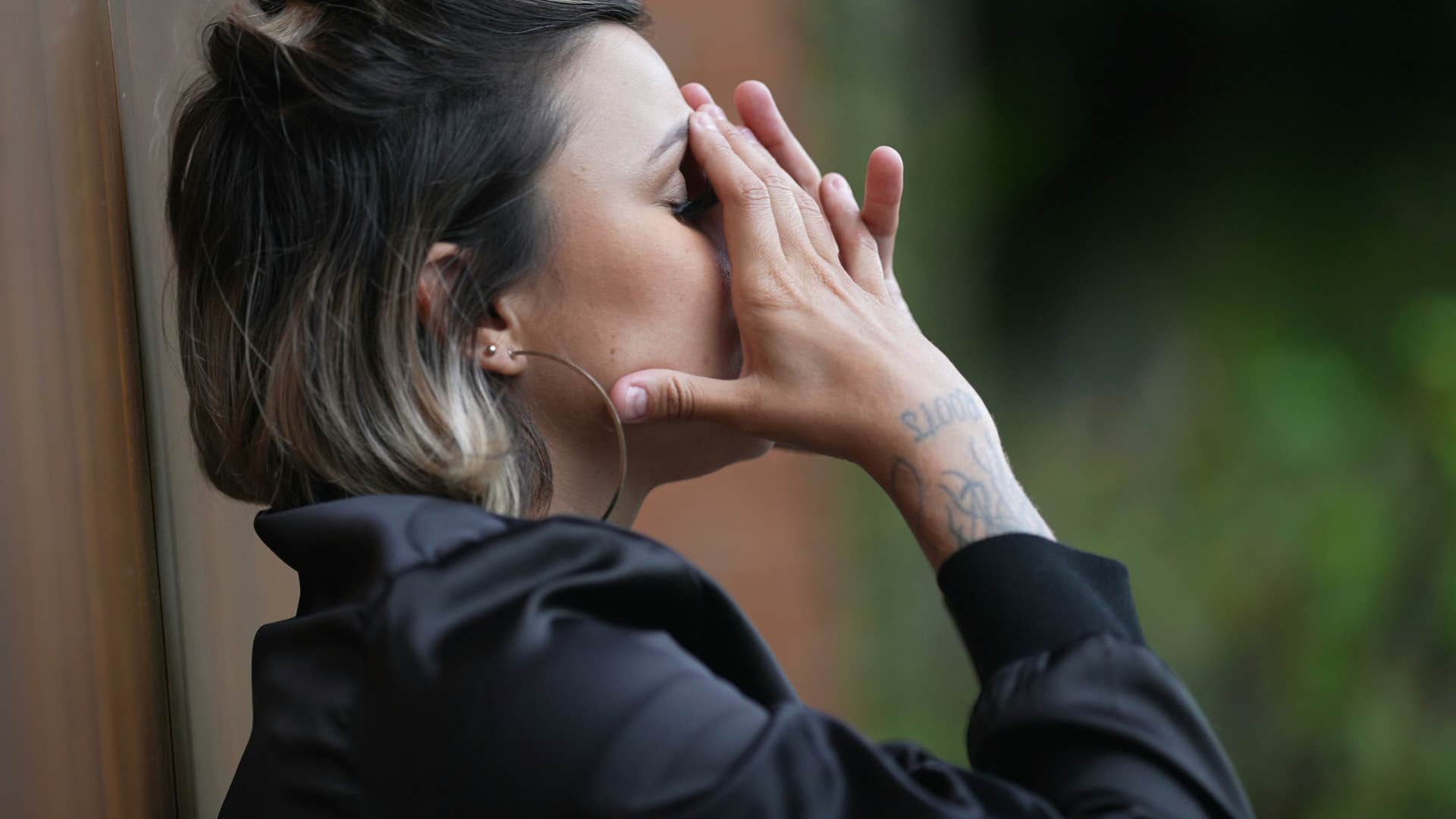11 Things Women Over 40 Get Judged For Now That Were Totally Acceptable 20 Years Ago
The good news is that the older you get, the less likely you are to care what anyone else thinks.
 Ground Picture / Shutterstock
Ground Picture / Shutterstock As difficult as it can be, getting older is a gift that affords women clarity and calm. The passing years bring hard-won lessons that would have been lost on their younger selves. Despite their insight and wisdom, many women worry about becoming middle-aged in a society that’s laser-focused on staying young.
Women are told to embrace getting older, even though they’re not embraced by the rest of the world. The many things women over 40 get judged for now that were totally acceptable 20 years ago, revealing how far we still have to go.
Here are 11 things women over 40 get judged for now that were totally acceptable 20 years ago
1. Getting cosmetic surgery
 AndreyPopov from Getty Images via Canva
AndreyPopov from Getty Images via Canva
In many ways, being a woman means wrestling with everyone else’s expectations of how we should behave. We get held to impossibly high standards, especially when it comes to physical appearance. We’re supposed to be effortlessly beautiful. We’re not supposed to care what we look like. If we do care, we get called shallow; if we don’t care, we get called ugly.
Women over 40 are bombarded with the message that gray hair and wrinkles are unattractive, but they still get told to age gracefully and naturally, whatever that really means.
20 years ago, it was totally acceptable to use Botox or get a little touch-up. Now, women over 40 who have cosmetic procedures are judged for not being authentic enough. They exist in a true double-bind: they’re judged for getting cosmetic surgery and they’re judged for not getting it.
2. Staying in an unhappy marriage
 Rido via Canva
Rido via Canva
Social norms are never static. With every generation, some things get carried over and other things change, which is especially true for the way people enter romantic relationships.
Divorce is less stigmatized than it used to be, in part because it’s way more common. Divorce is no longer seen as a moral failing, but staying in an unhappy marriage is. Women over 40 get judged if they stay in a relationship that doesn't fulfill them, even though that was totally acceptable 20 years ago.
According to Dr. Karen Finn, a divorce and life coach, splitting up isn’t the only option that unhappy couples have. From her perspective, jumping straight to divorce, without doing the work to try and mend the marriage, is the wrong move to make.
“Doing your best to resolve things before choosing divorce as your path to freedom from your unhappy marriage is important,” she explained. “Escaping an unhappy marriage isn’t a quick and easy thing. However, by understanding the true nature of your unhappiness first, you can make the best decision about how to finally find the freedom and happiness you crave and deserve.”
3. Expecting men to pay for dinner
 Minerva Studio via Canva
Minerva Studio via Canva
The dating scene is completely different now than it was 20 years ago. In the pre-Tinder era, gender roles and rules were more rigidly defined. Men asked women out on dates, not the other way around. He took her out to dinner at a restaurant of his choosing and he picked up the check at the end of the night.
Expectations around dating have shifted just enough that women get judged for automatically expecting men to pay for dinner. Women only make 84 cents to every dollar a man makes, but they get judged for not splitting the bill, in the name of gender equality.
4. Putting her job first
 andresr from Getty Images via Canva
andresr from Getty Images via Canva
Way back 20 years ago, women were told that the only way to be successful was to lean in. Being a girl boss was the ultimate goal. Hustle culture wasn’t just normalized, it was idolized. Women wanted to carve out a place for themselves in corporate boardrooms, so they went all in. They made work their life’s focus, then wondered why they were so burnt out.
Back then, it was totally acceptable for women to overcommit to their jobs, but now, women get judged if they put their jobs first. They don’t get praised for being ambitious, they get called out for having the wrong priorities and lacking work-life balance.
Divorce and life coach Dr. Karen Finn explained that balance is something every woman has to define for herself.
“Life balance is about your individual life,” she explained. “Life is about how you want to experience it, how you want to love the people important to you, and how you want to make the world just a bit better because you've lived.”
5. Trying to ‘have it all’
 PeopleImages from Getty Images Signature via Canva
PeopleImages from Getty Images Signature via Canva
It was totally acceptable for women to try to have it all 20 years ago, but now, they get judged if they still hold onto that belief. At its core, the idea that women can have it all is rooted in hope and optimism, but it’s not an accurate reflection of how our world works.
“It's time to stop buying into the fantasy of ‘having it all’ and come to terms with the reality,” therapist Ilene Strauss Cohen explained. “If we are honest, we can help younger women make better choices for themselves, choose what sacrifices they want to make, or be clear about their future.”
“We must figure out what's important to us and place our energy on those aspects of our lives, not unrealistic expectations,” she continued. “My message to this younger generation of women is not to put your energy into fantasy but to clarify what is important to you and how you want to structure your life.”
6. Perfectionism
 AndreyPopov from Getty Images via Canva
AndreyPopov from Getty Images via Canva
Women over 40 get judged for being perfectionists, even though perfectionism was seen as a totally acceptable personality trait 20 years ago. Women are under serious pressure to be perfect and make other people feel comfortable, even if that means shrinking themselves down. Even though the expectation of female perfection is projected by a male-dominated culture, women get judged for buying into that lie.
Psychologist and life coach Judith Tutin defined perfectionism as “the relentless striving for flawlessness and excessively high performance sets the high bar by which we consistently judge ourselves and find ourselves wanting.”
“You are more than your wins,” she explained. “Failure makes us human, and talking about failure allows us to get the support we need and increases our empathy toward others.”
7. Having regrets
 Zanuck from Getty Images via Canva
Zanuck from Getty Images via Canva
Women over 40 get judged for having regrets, since they’re expected to be completely fulfilled by middle age. Women get told to “live so you have no regrets,” but living with regret is woven into the fabric of getting older.
According to journalist Kathryn Shulz, “Regret is the emotion we experience when we think that our present situation could be better or happier if we had done something different in the past.”
She made a compelling case in favor of regret, saying, “If we have goals and dreams and we want to do our best, and if we love people and we don’t want to hurt them or lose them, we should feel pain when things go wrong.”
While regret is a normal human emotion, making a home there isn’t a healthy way to move through life.
“The point isn’t to live without any regrets, the point is to not hate ourselves for having them,” she said. “We need to learn to love the flawed, imperfect things that we create and to forgive ourselves for creating them.”
8. Losing weight
 charliepix via Canva
charliepix via Canva
It’s not easy for women to tune out the incessant body talk that follows them around, whether they’re 14 or 40. Our society exalts skinness and punishes fatness, yet women get judged for wanting to lose weight. As empowering as body acceptance and body positivity movements can be, there can be room for more than one thing to be true at one time.
“I see people feeling guilty for wanting to change their body because there’s so many people screamin about ‘just accepting your body the way that it is; you don’t need to lose weight,’” coach Maggie Sterling said.
“It’s true, you don’t need to lose weight and you should accept your body now,” she added. “But accepting your body does not equal that you don’t have goals that you want with your body or that you don’t have any interest in changing your body.”
No matter what their body type is, feeling good in their body is every woman’s birthright.
9. Wearing makeup
 Javier Sánchez Mingorance via Canva
Javier Sánchez Mingorance via Canva
Trends come and go, but women are always expected to meet certain standards of beauty. 20 years ago, wearing heavy makeup was totally acceptable, but now, it’s something that women over 40 get judged for.
The rise of social media made people crave authenticity, which led to the call for a natural, no makeup look. Being authentic is a good thing, but defining what authenticity is for other people only reinforces harm. If wearing makeup makes women (or men) feel like their truest selves, they shouldn't be judged for it.
10. People-pleasing
 Mladen Zivkovic from Getty Images via Canva
Mladen Zivkovic from Getty Images via Canva
Women over 40 get judged for being people-pleasers, even though putting everyone else’s needs first was totally acceptable 20 years ago. Social worker Terry Gaspard pointed out that people-pleasing behavior stems from poor boundaries and a lack of self-worth.
“Becoming a people pleaser is a way in which many individuals neglect to set boundaries and convey to others that they're not good enough,” she explained, noting that women are especially prone to people-pleasing.
“Over time, a lack of setting boundaries in relationships can damage a woman's sense of self-worth,” she revealed. “Fortunately, this damage is reversible with self-awareness and support from others.”
11. Feeling anxious about getting older
 Motortion from Getty Images via Canva
Motortion from Getty Images via Canva
In their 20s, women face the challenge of discovering who they are and how they want to live. They spend their 30s doing the difficult work of coming into their truest selves. Once they’ve reached 40, women are expected to have found complete inner peace and self-acceptance. Women over 40 get judged for worrying about getting older, an anxiety that was totally acceptable 20 years ago.
The truth is, no one’s life is ever clearly defined or fully complete. There will always be parts of ourselves we’re unsure of. That uncertainty doesn’t mean we’re not worthy, it just means we’re human.
Alexandra Blogier, MFA, is a staff writer who covers psychology, social issues, relationships, self-help topics, and human interest stories.

